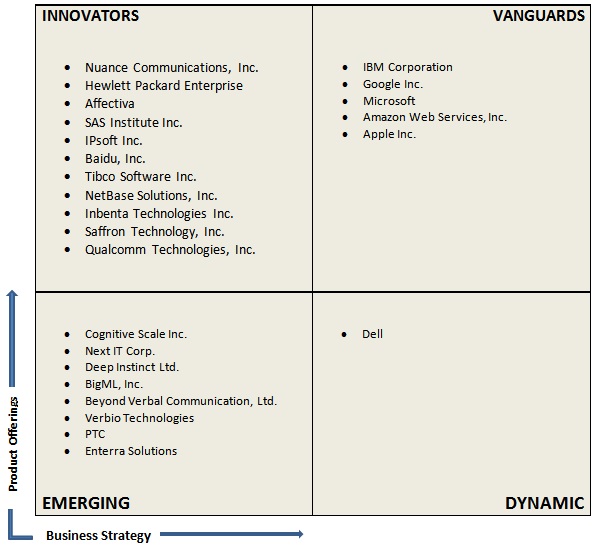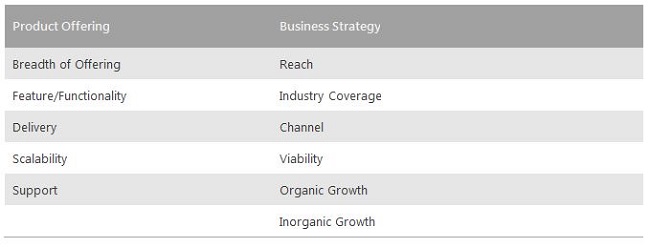Vendor Comparison in Cognitive Computing – 2017 : MnM DIVE Matrix
[103 Pages Report] In today’s business world, there is an ever-rising demand for the adoption of wearable devices, cloud technologies, and Internet of Things (IoT), and companies are seeking to gain valuable insights from large and complex unstructured data sets to make critical business decisions. Traditional computing systems often fail to fulfill all the business demands as compared to the cognitive computing technology. Cognitive computing solutions offer functionalities that enhance the overall business performance and revenue and cater to the current business demands of organizations across the globe.
MarketsandMarkets defines “Cognitive Computing” as an interdisciplinary branch of Artificial Intelligence (AI) and cognitive technology which is used to capture, store, process, and interpret the input data in terms of speech, text, or human emotions while generating decision making results in real time. It mainly uses the Natural Language Processing (NLP), machine learning tools, and automated reasoning to provide solutions for various complex problems. Some of the features of an efficient cognitive computing solution include adaptive, interactive, contextual, iterative and state full, and imitating human brain qualities.
The Vendor Comparison in Cognitive Computing report based on the MnM DIVE methodology analyzes and evaluates the key vendors in the cognitive computing market.
To know about the assumptions considered for the study, download the pdf brochure
Vendor Inclusion Criteria
We have selected 25 vendors for evaluations based on the breadth of their product offerings and business strategies. The focus of our vendor evaluation is on the products these vendors offer in the cognitive computing market. A comprehensive list of all the vendors in this market was prepared through a product mapping strategy and the MarketsandMarkets analysis. Based on their capabilities, innovations, and breadth of product offerings, vendors were shortlisted. The selected vendor mix includes the top 25 cognitive computing vendors who were selected based on the prior mentioned parameters.
Vendors Evaluated
The report covers a comprehensive study of the key vendors offering cognitive computing solutions. We have evaluated the following 25 vendors: Microsoft, IBM Corporation, Hewlett Packard Enterprise, Google Inc., Nuance Communications, Inc., Saffron Technology, Inc., SAS Institute Inc., Amazon Web Services, Inc., Baidu, Inc., Apple Inc., Inbenta Technologies Inc., TIBCO Software Inc., Affectiva, NetBase Solutions, Inc., Deep Instinct Ltd., Qualcomm Technologies, Inc., Cognitive Scale Inc., IPsoft Inc., PTC, Enterra Solutions, Next IT Corp., Dell, Verbio Technologies, BigML, Inc., and Beyond Verbal Communication, Ltd.
We have placed the vendors into 4 categories based on their performance in each criterion: “Vanguards,” “Innovators,” “Emerging,” and “Dynamic.”
The matrix will look like the figure shown below:

Vanguards: Vendors who fall into this category receive high scores for most of the evaluation criteria. They have strong and established product portfolios and a very strong market presence. They provide mature and reputed solutions. They also have strong business strategies.
Innovators: Innovators are vendors that have demonstrated substantial product innovations as compared to their competitors. They have very focused product portfolios. However, they do not have very strong growth strategies for their overall business.
Dynamic: They are established vendors with very strong business strategies. However, they score low in the product portfolio. They usually focus on a specific type of technology related to the product.
Emerging: They are vendors with niche product offerings and are starting to gain their position in the market. They do not have very strong business strategies as compared to other established vendors. They might be new entrants in the market and require some more time before gaining significant traction.
The major challenge for any business today is to bridge the gaps between data collection, insights, and actions. Cognitive computing solutions help businesses to bridge these gaps. The data generated throughout organizations by machines and business processes, and the volume of structured and unstructured data are increasing at exponential rates. Cognitive systems generate valuable insights from unstructured content, analyze the information, and present relevant answers to users to help them make accurate and effective business decisions that impact performance and revenue.
The major growth drivers of the cognitive computing market include increasing adoption of wearable devices, advancement in enabling technologies, adoption of cloud-based technologies and Internet of Things (IoT), and rising demand for fetching valuable insights from large and complex data sets. The cognitive computing market faces challenges such as the absence of governing bodies and regulations, and high costs of deploying cognitive solutions.
The Vendor Comparison in Cognitive Computing report based on the MnM DIVE methodology reviews the major players that offer cognitive computing solutions and outlines the findings and analysis on the basis of 2 broad categories: Product Offerings and Business Strategies. Each category carries various criteria, based on which the vendors are evaluated. The criteria are provided below:

Based on extensive secondary and primary research, key information about the vendor product offerings and business strategies was gathered. After the completion of the data gathering and verification processes, the scores and weightage for the shortlisted vendors against each parameter were finalized. After evaluating all the vendors, a comparison scorecard was prepared and each vendor was placed in the MnM DIVE matrix based on their product offering and business strategy scores.
This report is instrumental in helping the stakeholders such as cognitive computing vendors, system integrators, consultants, value-added resellers, and technology partners to make business decisions for the deployment of cognitive computing solutions.
The report covers a comprehensive study of the key cognitive computing vendors, including Microsoft, IBM Corporation, Hewlett Packard Enterprise, Google Inc., Nuance Communications, Inc., Saffron Technology, Inc., SAS Institute Inc., Amazon Web Services, Inc., Baidu, Inc., Apple Inc., Inbenta Technologies Inc., TIBCOSoftware Inc., Affectiva, NetBase Solutions, Inc., Deep Instinct Ltd., Qualcomm Technologies, Inc., Cognitive Scale Inc., IPsoft Inc., PTC, Enterra Solutions, Next IT Corp., Dell, Verbio Technologies, BigML, Inc., and Beyond Verbal Communication, Ltd.
To speak to our analyst for a discussion on the above findings, click Speak to Analyst

Table of Contents
Introduction
About the Document
Market Definition
Stakeholders
Premium Insights
MnM Dive Overview
Dive Evaluation Criteria
Vendor Inclusion Criteria
Vendors Evaluated
MnM Voice: Cognitive Computing Solutions
Cognitive Computing Solutions: Emerging Cognitive Computing Technologies Offer New Alternatives for Empowering Businesses and Enhancing the Overall Performance
Cognitive Computing Solutions: Best Practices
Cognitive Computing: Vendor Comparison
MnM Dive Vendor Comparison Scorecard
MnM View
Vendor Profiles
Microsoft
IBM
HPE
Google
Nuance Communications
Saffron Technology
SAS
Amazon Web Services
Baidu
Apple
Inbenta Technologies
Tibco
Affectiva
Netbase Solutions
Deep Instinct
Qualcomm Technologies
Cognitivescale
Ipsoft
PTC
Enterra Solutions
Bigml
Beyond Verbal Communication
Next IT
Verbio Technologies
Dell
Appendix
MnM Dive: Vendor Comparison Methodology
Matrix Description
List of Abbreviations
Related Researches
References
Author Details















Growth opportunities and latent adjacency in Vendor Comparison in Cognitive Computing